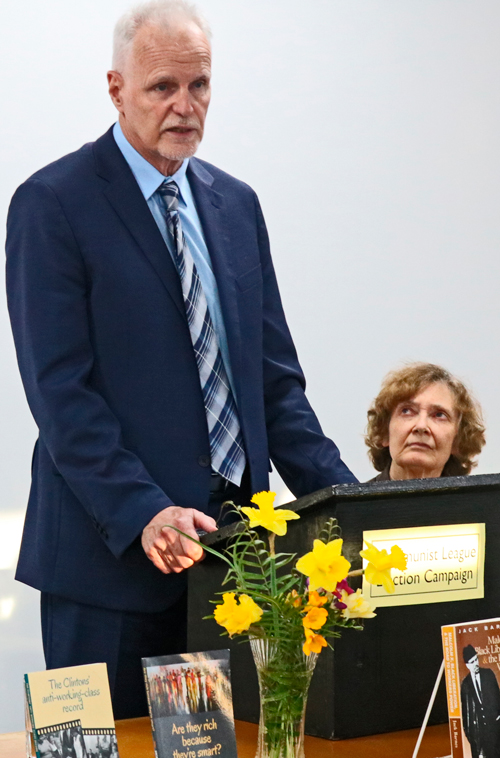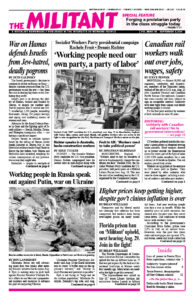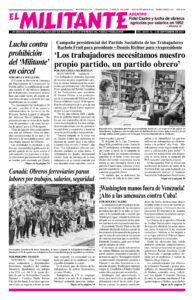
SYDNEY — The Socialist Workers Party candidate for U.S. vice president, Dennis Richter, campaigned here for several days in mid-August along with Robert Aiken, the Communist League candidate for mayor of Liverpool. CL campaigners took advantage of building for the visit by taking the word to union actions by electrical and construction workers, and campaigning door to door and at street venues.
Richter joined Aiken Aug. 15 campaigning at the Liverpool Railway Station, and the two candidates addressed a public meeting in the city Aug. 17.
“The Communist League campaign raises a voice for working people in face of rising prices, unemployment, inadequate housing and health care, and attacks on our rights,” Aiken said. “We champion union fights and encourage solidarity. Right now we urge defense of the construction workers’ union in face of a major union-busting assault by the ruling class and its government.
“We call for solidarity with Ukraine’s fight to defend its independence in the face of Moscow’s invasion,” he said, “and oppose rising Jew-hatred and the deadly Iran-backed pogrom carried out by Hamas in Israel last October.”
Political questions are class questions
“Every question we face in the U.S. election is a class question,” Richter told the meeting. “The Socialist Workers Party campaign explains the need to build a party of labor to unite all working people to fight. Such a party will strengthen workers as they act together and gain confidence and class consciousness. We produce everything and we have the power to challenge the bosses and their political parties, the Democrats and Republicans.
“Workers need our own foreign policy, as the capitalist rulers worldwide are driven into deeper rivalries with their competitors and the threat of new wars spreads,” he said.
In the lively discussion period, one participant described the low wages and substandard conditions for contract workers from Pacific Island countries in fruit-packing sheds in a rural region where she had been working. “Migrant workers are used by the bosses to force down wages,” Richter said. “That’s why the unions need to demand that they have the same rights as other workers, to unify the working class.”
Another participant asked Richter to say more about U.S. politics and the new stability shown in the two main capitalist parties. “Six months ago they were in a crisis,” he answered. “Now they’re both unified around their candidates. But they still have to convince working people to vote for them. Our campaign finds many workers don’t trust either of them, and our program and candidates get a hearing, and some want to get involved with us.
“As you’re drawn into labor battles, you want to learn more about class society and its history,” Richter said. “You need free discussion and debate. That’s why we fight for civil discussion and against shutting down free speech.”
Richter was asked, what does the rise of antisemitism tell us about the world today? “Jew-hatred took on a new and distinct function after the onset of the imperialist epoch, as we saw in Germany in the 1930s,” he said. “In times of crisis, the rulers scapegoat Jews to turn attention away from themselves, and mobilize reactionary Nazi gangs against the workers movement.
“Rising Jew-hatred today is a reflection of capitalism’s growing world disorder. It’s built largely in the middle class, who increasingly see they face ruin. But we find a different response among workers.
“The contradictions we face today will continue until there is a new rise of working-class struggles that show a road forward,” he said. “For now, it is necessary to stand up to any instance of Jew-hatred.”
‘I want to join in’
“I want to go out campaigning” for Aiken’s campaign, Julie Musgrove, a pathology-laboratory receptionist, told the Militant, “and to have more meetings with speakers from abroad, so we can learn about what is happening in the real world, rather than what the media tells us.”
Although she is employed by a multi-billion-dollar company, she said the bosses won’t fix broken doors and switches that threaten worker and patient safety where she works.
Tammy Koro, a pick-and-pack warehouse worker, said, “I came because I wanted to learn more about what the working class is, and I really liked what Dennis explained. I think working people should have our own party.”
On Aug. 16 Richter and Aiken had coffee with Kelvin Ozurumba, a nurse at Canterbury Hospital and branch president of the Nurses and Midwives Association there. They discussed the conditions facing nurses in New South Wales and in the U.S., including in Louisiana where Richter had joined nurses fighting for a contract in July.
“Here we’re fighting for a decent pay rise,” Ozurumba said. “Prices are going up and we are losing nurses.” He said that student fees are high and “student nurses can’t find part-time jobs. So they’re forced to move elsewhere.”
“In the U.S. we face similar problems. Education is class-based,” Richter said. “My campaign backs fights for decent wages to live on, so nurses and others can do their job and have a life at the same time. In Louisiana the nurses stress they are taking action for both nurses and patients.”
“The crisis falls heaviest on the rural population,” Richter said. “In the countryside hospitals don’t yield enough profits, so they’re being closed.”
“We face the same problems,” Ozurumba responded. “More and more doctors are leaving rural areas and going to the cities.”
Nurses and midwives here are planning to take further industrial action, he said. The most important thing is the unions acting in solidarity. “We find as we campaign that working people are in a mood to fight today,” Richter said. “The starting point is solidarity.”
Linda Harris contributed to this article.

